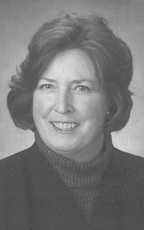 Sarah Cunningham, Ph.D., was instrumental in bringing distance-learning opportunities to many rural schoolchildren of central Nebraska.
Sarah Cunningham, Ph.D., was instrumental in bringing distance-learning opportunities to many rural schoolchildren of central Nebraska.
Now, she’d like to play a role in helping children from those same areas become interested in health-care professions, so that some day, they’ll get their health education and practice in rural areas.
Dr. Cunningham is the first executive director of the Central Nebraska Area Health Education Center, the first such center in Nebraska. As executive director, Dr. Cunningham will report to a local, 15-person Board of Directors that has members from areas such as education, health care, government and the private sector.
“It’s exciting to me to see so many different facets try to work toward a common vision of sustainable, quality health care in central Nebraska,” Dr. Cunningham said. “We have to save the schools and the health care in our rural communities, or they will dry up and die.”
In her 14 years with Central Community College, based in Grand Island, Dr. Cunningham did plenty to help rural schools thrive.
As director of instructional technology at CCC, she wrote an initial proposal that later became a legislative bill — LB833 — that provided funds for the state education department to provide distance education capabilities to all K-12. Of the 55 locations that didn’t have those capabilities at that time, 24 were in CCC’s area.
With their schools equipped to provide distance education, students now have the opportunities to take college-credit courses before leaving high school. They also have access to courses that may not have been offered previously in their high schools, such as specific foreign languages and high-level math courses.
The approach of taking the education to the people through technology can also be applied to health care, said Dr. Cunningham, who also served on the distance learning subcommittee of the Nebraska Community Colleges Association and is the current president of the Nebraska Distance Learning Association.
“If we can help them to get their prerequisites to their health-profession education close to home, that helps develop that bond and entices them to come back to practice once they’ve received their degree,” Dr. Cunningham said. “Eighty-five percent of students stay within the area of where they attended school. We need to keep them here as long as possible.”
Dr. Cunningham said she sees telehealth where education was 10 years ago. “If we can avoid some of the pitfalls that education went through in becoming connected, I think we can help to bring a better quality of life, for not just central Nebraska, but all of the state.”
Providing distance education opportunities is only part of the Central Nebraska AHEC’s plan, though. The center hopes to improve the supply and distribution of health care professionals through partnerships among health care, academic and community providers. Both nontraditional students and minority students will be targeted to help fill shortages that already exist in Central Nebraska.
Educating adults about wellness is also a key, she said, as is introducing the health careers to students when they’re young.
“If we can open their eyes at a much earlier age, sharing them the real array of opportunities available to them, we’ll be more successful in attracting them to health careers,” Dr. Cunningham said. “And, if we can take the fear out of going into health care, even for non-traditional students, we’ll be able to make great strides.”
An Omaha native, Dr. Cunningham received her bachelor’s degree at the University of Nebraska-Lincoln, her MBA at then-Kearney State College, and her doctorate in vocational and adult education at UNL.
She and her husband, John, have a 14-year-old daughter, Leslie. She enjoys scuba diving in the Caribbean and swimming.